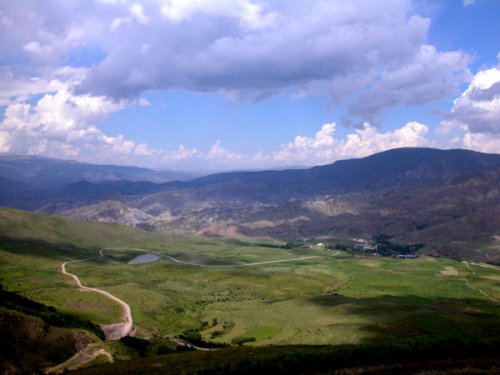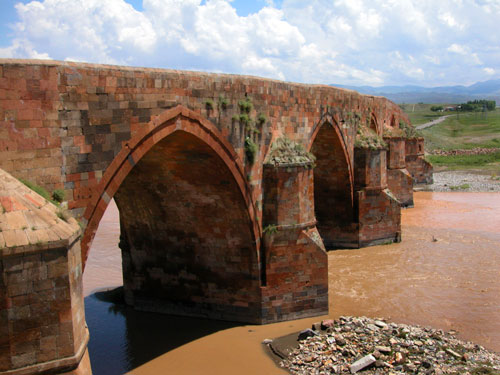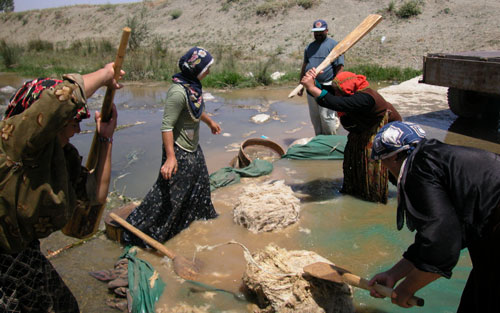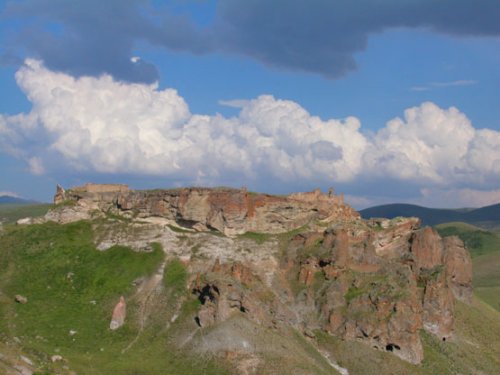The Joys, And Pains of Eastern Turkey
A woman and her kitty invited us to make their portrait
An Old Silk road fortress, and the New Silk Road, new oil pipeline
Entering Turkey
(Bob)
The border crossing from Georgia to Turkey took all of 45 minutes, and went without a hitch. We were blue from holding our breaths. We were warned of very bad mountains ahead, but could not believe anything could be worse than the last 20k of swimming pool sized potholes and absurdly steep grades: wrong. The world immediately turned vertical and stayed that way for two weeks, however, we were rewarded with a newly beautiful landscaped carpeted with wildflowers, peopled by friendly Muslims living in villages and small cities peppered with mosques and good food.
 The mountains were long and steep, with near vertical mile mountains all too common and grades way too steep for tandem loaded touring. Once we had two nights bush camp and long distances of dirt road through remote villages, nearly lost and exhausted. At two villages we were told to beware the “terrorists” in the mountains we were going through; we were very near the border with Georgia and Armenia. Something might be going on that we in the West are not hearing about. We had one long night of severe thunderstorms, wondering if we would be flooded, and days of sweat pouring heat despite the elevation.
The mountains were long and steep, with near vertical mile mountains all too common and grades way too steep for tandem loaded touring. Once we had two nights bush camp and long distances of dirt road through remote villages, nearly lost and exhausted. At two villages we were told to beware the “terrorists” in the mountains we were going through; we were very near the border with Georgia and Armenia. Something might be going on that we in the West are not hearing about. We had one long night of severe thunderstorms, wondering if we would be flooded, and days of sweat pouring heat despite the elevation.
 But, the landscape just kept getting more “güzel” (beautiful) with each pedal stroke, as the people became more generous and friendly. All too often the best and the worst of bicycle touring occur simultaneously.
But, the landscape just kept getting more “güzel” (beautiful) with each pedal stroke, as the people became more generous and friendly. All too often the best and the worst of bicycle touring occur simultaneously.
Women beating wool in a stream on a hot day.
 Muslims are so open to Westerners and the hospitality they practically force on you is overwhelming: we are offered chai (tea) several times a day and feel guilty that we seldom accept, knowing that it will turn into an hour at least of language frustration, but leading eventually to some wonderful human communication, we just don’t have that many hours. However; when we do take the time, we can tell they are profoundly disappointed when their new friends turn out to be Americans; they oppose US policy against the Muslim nations (as they see it) and yet seem to really like us personally. It is difficult for us to be representatives of an American foreign policy we ourselves disagree with; Turks themselves live in a democracy and seem to understand that the people and policies you vote for do not always win.
Muslims are so open to Westerners and the hospitality they practically force on you is overwhelming: we are offered chai (tea) several times a day and feel guilty that we seldom accept, knowing that it will turn into an hour at least of language frustration, but leading eventually to some wonderful human communication, we just don’t have that many hours. However; when we do take the time, we can tell they are profoundly disappointed when their new friends turn out to be Americans; they oppose US policy against the Muslim nations (as they see it) and yet seem to really like us personally. It is difficult for us to be representatives of an American foreign policy we ourselves disagree with; Turks themselves live in a democracy and seem to understand that the people and policies you vote for do not always win.
 Halfway up the dirt road mountain the village said we could not climb. The village is the dark green trees deep in the valley, and it was half a day climb from our bush camp.
Halfway up the dirt road mountain the village said we could not climb. The village is the dark green trees deep in the valley, and it was half a day climb from our bush camp.
Pasinler, Turkey
Things, and people, are not always what they seem:
The severe countenance of the hotel owner didn’t bode well for our relationship. He refused to deal with Claire, as a woman unfit for handling money or making decisions, and generally seemed to find us a distraction to his tea house. A couple of hours later he burst into our room uninvited without knocking, and demanded our passports. Being a bit put out by his behavior, I refused to give them up, and followed him to the office where I handed them to the young man he had working the computer. The grump went to the hall sink and began washing his feet, hands, face and neck in a way that reminded me of something someone else had shared with me: the peasant farmer in Azerbaijan who had taken me to the stream and showed me his way of washing before the tea the women were preparing at our tent. Then the grump came back into the room barefoot and carefully placed his prayer rug on the floor facing Mecca. He stood at the foot of his prayer rug, folded his hands and dropped his chin to his chest and began to pray audibly, quietly; he wiped his hands over his face and prayed more, then bent to rest his hands on his knees, dropped to his knees and then prostrated himself to touch his forehead to the top of his prayer rug, and repeated the sequence.
 All the animosity at his seemingly rude behavior melted away as I watched this man unselfconsciously pay homage to the Creator as humans have done in one manner or other since before recorded history: he is the elder in my country church praying softly in the pew, my father’s gentle grace before each meal, the Buddhist monk lighting incense in a Bangkok temple, and my own expression of joy at the beauty of a wildflower, the workings of my muscles against gravity. He is any of us who are thankful for the mystery of our existence, of the universe. We have that bond no matter our external differences; would that we could learn to make the internal external in this all too selfish world. Spirituality will someday be that which unites us, not that which divides us.
All the animosity at his seemingly rude behavior melted away as I watched this man unselfconsciously pay homage to the Creator as humans have done in one manner or other since before recorded history: he is the elder in my country church praying softly in the pew, my father’s gentle grace before each meal, the Buddhist monk lighting incense in a Bangkok temple, and my own expression of joy at the beauty of a wildflower, the workings of my muscles against gravity. He is any of us who are thankful for the mystery of our existence, of the universe. We have that bond no matter our external differences; would that we could learn to make the internal external in this all too selfish world. Spirituality will someday be that which unites us, not that which divides us.
July 4. Happy birthday America! from Pasinler, Turkey.
After the highest mountains of Eastern Turkey, the elevations lowered but the climbs remained at or near 1,000 meters, over 3300 feet, and unfortunately the temperatures soared to 38 to 41 degrees Celsius, 100 to 107 F as measured on the bike computer, about sweaty crotch level. We took to stopping to soak our shirts in roadside streams and carrying a extra liter of water for pouring over ourselves as we cranked away the hours on the sometimes 20k climbs at the glacial speed of 5 to 7 k per hour. What fun. Will this ever end? Fortunately there were lovely scenes to photograph, when my sweaty hands could hold the camera, and friendly Turks waving, beeping and generally expressing amazement and support for our endeavor. Crazy Westerners.
 Very sweet. They spoke some English. He was the male relative chaperone. Very sweet young people. The one in the middle is unmarried, out to be seen, in the proper Muslum way. With that smile how can she miss?
Very sweet. They spoke some English. He was the male relative chaperone. Very sweet young people. The one in the middle is unmarried, out to be seen, in the proper Muslum way. With that smile how can she miss?
 Rampar, rampart or mountain, steep place. See the tiny road far below, half a days’ pedal from the village of Posof, on the other side of the valley, and still far from the top. Beautiful view.
Rampar, rampart or mountain, steep place. See the tiny road far below, half a days’ pedal from the village of Posof, on the other side of the valley, and still far from the top. Beautiful view.
(Claire)
“Look, up in that cloud, it’s a … it’s a truck!” Sure enough, right next to the snow bank in the wispy clouds was a long-haul truck creeping further up the mountain. The border guards had warned us that Georgia’s mountains were nothing compared to Turkey’s but that still hadn’t prepared us for the 20-kilometer-, 4,690-foot climb that lay above us. Sure, it’s doable, at 7-10% grades, but a cyclist would like to mentally prepare for a day of 6 kph riding. We still hadn’t found a good map of Turkey. The day grew hotter as we finally rounded the curve where the truck had been hours ago only to find: more climbing. Three maddening false summits later, we could see the top. Most of the morning, we were in sight of the town of Posof, where we’d spent our first night in Turkey. I could imagine the gathering of men still waving at us and laughing at the crazy couple on a tandem. We knew we were close to the pass when the friendly beeps from the truckers grew more emphatic and encouraging. At a popular spring near the pass, one trucker repeatedly offered us a ride. One corner lower and a Snickers bar earlier and I might have taken him up on it. As it was, we weren’t about to surrender the great downhill that awaited us on the other side.
Though we always hope for the best but plan for the worst, I really didn’t want to plan for any more climbs like that. We quickly learned the word “rampar,” which has something to do with big hills or mountains. It turns out that Turkey really is tilted up on the right and the passes have decreased proportionately in difficulty as we’ve come West. We still had an adventurous ride up and over a 10-kilometer dirt road where a van driver backed down a half kilometer to our lunch stop just to offer us a ride. He indicated it would get steeper at the top and seemed concerned when still we declined. We made the pass just fine but the road construction on the other side meant no screaming downhills.
 Drying out after a night of thunderstorms within sight of Noah’s Ark.
Drying out after a night of thunderstorms within sight of Noah’s Ark.
Mountain meadow
First Aid
(Bob)
July 11, at the top of a moderate climb, we stopped for a pee and some snacks, a photo. As we were packing up a man ran at us from around the curve ahead: short hair and close cropped beard of most Turkish men, a red patterned sweater, faded dress trousers and loafers. He was carrying his socks, and waving like he was chasing a runaway tractor. We he got to us he waved his socks at us and talked non-stop. We tried the Turkish dictionary and also the phrasebook to no avail. He was very agitated about his socks. He kept talking as if we could understand if he just said the thing he wanted us to know enough times; a Turkish trait.
Claire asked, “Problem yok?” meaning: Is there a problem? Then he showed us his little toe on his left foot, his brow furrowing with concern. It looked fine to me, but Claire thought it might be an ingrown toenail. I decided that doing anything was better than listening to him for much longer, and I had begun to think him mentally unbalanced.
So, I did what I had seen in old Great White Explorer movies; I “doctored” his toe with zinc oxide ointment I use for saddle sores. He appeared to be much relieved as I took a long time to lovingly rub his little toe as his foot rested on Zippy’s top tube. It is a moment I will not soon forget, massaging an unbalanced stranger’s little toe by the side of the road in a foreign country, and not understanding any of it. Sometimes the human touch is all that is needed, and he appeared cured. Problem number one solved, he then decided, in pantomime, that he wanted a ride on Zippy to the next town. At that point we waved and rode away quickly, “Gule, Gule.” Goodbye.
 Showing off his horses in the high summer pastures. Not a bad life.
Showing off his horses in the high summer pastures. Not a bad life.
 Bridge built in the 1200s; still in use by farmers.
Bridge built in the 1200s; still in use by farmers.
Currency Exchange
(Claire)
I’d been saving a few Georgian Lari for the next cycle tourist that came our way. After many days, Jibi, a world cycle tourist from Canada, rode our way. We quickly found some shade in a quiet driveway to spread out huge maps to exchange information. Soon the children beyond the garden fence heard our discussion and came pouring out the gate. Who knows what it must’ve been like for them to discover three exotic looking people on two bikes in their yard. Bob guarded Zippy’s crucial parts from curious fingers while Jibi and I finished with details about great apricot orchards and road construction. Eight mixed age children looked like enough for a party to me so I broke out the balloons and started making hats. They took turns with Bob’s wrap goggles and posing for the camera. Soon they managed blowing up balloons for themselves and they quickly learned to twist them into shape. It was so fun to spend time connecting with these nice kids without being able to understand a word between us. After a time, they understood that it was time for us to leave, and they pleaded for us to stay just a little longer. We would’ve loved to, but we each (us and Jibi) still had kilometers to go, in different directions. I forgot all about giving Jibi the Georgian Lari. Oh well. They’re not heavy.
“Chai, Chai!”
“You will remember me,” said the note, handed to us by the two armed Jandarmas. The neatly handwritten note was an invitation to tea with the commander of the district. The two guards had been waiting who-knows-how-long for us to ride by. The commander had seen us upriver that morning and now it was late afternoon. After some of the experiences we’ve had with officialdom in this part of the world, we’re keen to limit our exposure to authority figures. “This is one invite I don’t think we can turn down,” I said to Bob as we followed the Renault wagon uphill to the post. We’d been turning down hospitable offers of chai several times a day since Azerbaijan, and again as we headed for our tea appointment with the commander, we turned down yet another offer of chai along the one kilometer detour from a group of men sitting in the shade of some trees.
The thought of a hot tea break during a hot, sweaty ride can be unappealing, so it’s usually easy to just keep going, though we often feel bad hearing the pleading tones of the men beckoning. At the military base, we were escorted into a large cool office and promptly served cold mineral water. Between phone calls and interruptions, we shared some welcome conversation with the English speaking commander. He had served next to American and other International forces in Macedonia. Now, with a family, he moves from post to post around Turkey. We looked over maps and he warned us of yet another pass and some road construction. Next, it was time for chai with chocolates.
We left feeling refreshed and energized to finish our 100 kilometer day. Maybe there’s something to that chai tradition after all.
 Sunflowers
Sunflowers
A pro tax businessman? July 15 Kayseri.
(Bob)
Ours were the only cries of anguish when the power went out at the Internet café in Kayseri. Everyone else just turned off their computers and retired to the lounge for a game of backgammon. We finally figured out that this was a regular enough event that we should kick back also and go have tea in the lounge. A young woman, fashionable college student, and a middle aged carpet salesman, both English speakers, struck up a conversation with us about Turkey entering the European Union. She thought it was a good idea, that Turks could maintain their culture while joining Europe for economic gain, because what is important to Turks is not money, but family, community. The man disagreed, saying that Turkey was already losing its culture to consumerism, and it would be worse for Turkey to become more European, since he generally didn’t like European culture.
 All this economic talk led to a discussion of corruption and taxes. The business man admitted to paying as little as $300 on profits in the 100,000’s of thousands of dollars of carpet sales. Everyone does it, and no one does anything about it because it benefits too many individuals. This is what surprised us: He felt Turkey would never be able to contribute to Europe or the world economy, until it reformed the tax system so everyone paid much more tax. This is an unusual position for a businessman to take: he feels the loss of money for a western standard infrastructure is holding Turkey back, and the selfish motive for low taxes is misguided. Certainly the two or three hours the city, a manufacturing center, was without electricity this day, and several days a week, represented a huge cost in productivity. Getting a foreign perspective can be enlightening.
All this economic talk led to a discussion of corruption and taxes. The business man admitted to paying as little as $300 on profits in the 100,000’s of thousands of dollars of carpet sales. Everyone does it, and no one does anything about it because it benefits too many individuals. This is what surprised us: He felt Turkey would never be able to contribute to Europe or the world economy, until it reformed the tax system so everyone paid much more tax. This is an unusual position for a businessman to take: he feels the loss of money for a western standard infrastructure is holding Turkey back, and the selfish motive for low taxes is misguided. Certainly the two or three hours the city, a manufacturing center, was without electricity this day, and several days a week, represented a huge cost in productivity. Getting a foreign perspective can be enlightening.









Pingback: Tai Shan » Blog Archive » Now That’s How to Travel
Pingback: Tai Shan » Blog Archive » The New Bohemians in Beijing
Hi Bob, Hi Claire,
I was just checking your web site and came across the photo taken in Nallihan-Turkey.(all three of us togather.) Good memories 🙂
You are always welcome to visit me again in Nallihan
All the best for you guys and have a happy new year
Orkun Ates from Nallihan-Ankara/Turkey
Hi Orkun! What a treat to see you found us again. As you can see we haven’t quit adventuring, back to Asia twice since the Silk Road and Australia again. Hope all is well with you. Yes we do remember well our time together in the Nallihan square. It was a highlight of Turkey since your English is so good. All the best.